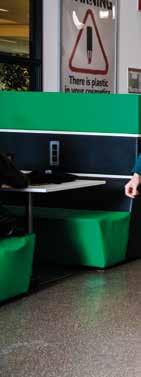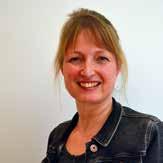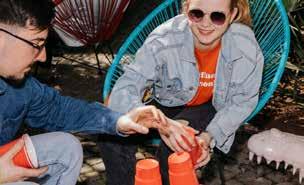Voorbij Zuyd
Magazine for Zuyd University of Applied Sciences Alumni 2022|2023
Getting on top of your thesisHow do you approach this?
Further studyAbroad
Zuyd helpsRead from whom and where you can get help

ApplyingPromote your talent
Hi
This magazines contains everything you need to know about the final phase of your studies!
Applying for jobs successfully: Promote your talent

Publisher’s imprint
Voorbij Zuyd is the magazine for Zuyd University of Applied Sciences Alumni. If you have any ideas for this magazine, send us an e-mail! This will help us make sure next year’s students are even better prepared for their graduation phase.
Editors Marketing and Communication Services, Zuyd University of Applied Sciences communicatie@zuyd.nl


Text Corine Castenmiller


Franc Coenen
Jos Widdershoven
Judith Houben
Lizette Colaris
Margo van Vlierden
Mirjam Flink
Nicole Vijgen
Students from the Journalism and Commercial Writing minor at Zuyd University of Applied Sciences
Photography
Debbie Gropstra
Johannes Timmermans
Jonathan Vos
Nathan Marriott
Philip Driessen

Design Ontwerpbureau Homo Ludens
Printing
De Bondt Grafimedia Communicatie
Thank you to all the students and staff who have contributed to this magazine.
Edition: May 2023
Follow us on social media

2 / voorbij zuyd Content Ferné started studying abroad 10 30 Writing your thesis! How do you approach this? Psychological problems increasing among students
12 18
And... 4 Don’t let borders hold you back, but cross them 6 Internships abroad 8 Keep improving yourself at Zuyd Professional 14 Three thesis pitfalls 16 Find a great job thanks to your contact with Zuyd 20 Take all the help you can get! 22 A Master’s degree will help your CV stand out 24 How to find the perfect Master’s degree 26 Work first or do a Master’s degree? 28 Career switch: from judge to coach 31 Yes! Got the interview! 32 Workshop ‘Choose your future’ 34 The recipe for a perfect CV 36 Are you in the MOOD? 38 Starting your own business 40 End of study checklist
The time has come: the final phase of your university of applied sciences bachelor’s degree is fast approaching! Maybe it's sooner than you thought, or maybe you’re thinking, finally... what an exciting phase. And will this mark the end of your studies, or would you like to study further? In the Netherlands or abroad?
Graduating starts with finding an internship, doing the internship and writing a thesis or completing a graduation project. You’ll have to deal with a lot during this time, as well as all the practical matters that need to be arranged when you graduate. Do you already have an idea of everything you’ll need to do?
That’s why we’ve produced this Voorbij Zuyd, the magazine that gives you so much information and tips that will be really useful for you at this stage. Browse through and read the articles and tips that look interesting for you! We hope this will help you on your way to a fantastic graduation period and, of course, to that one goal that it’s all about: your bachelor’s degree!
We hope you enjoy reading it and wish you all the best for your studies and graduation!
Editors
* Check the lightbulbs throughout the magazine for all our handy tips.
voorbij zuyd / 3 Voorbij Zuyd Foreword
Language course German or English at Zuyd
Communication is very important. Not only in the Netherlands, but especially when you want to start working abroad. If you’ve already mastered the language, this will give you a head start. You can follow a language course for German or English at Zuyd University of Applied Sciences. In most cases, these courses are free or very inexpensive.
For more information, see zuydnet.nl and register via language.courses@zuyd.nl

‘Don’t let borders hold you back, but cross them’
Because you will soon receive your bachelor’s degree, you’re probably already looking for the right job. You could simply stay in the Netherlands, or you could also look across the border. This might be less complicated than you think and is sometimes also much closer to home. Moreover, there’s plenty of help out there. This article tells you more about the opportunities for working abroad. It doesn’t matter if you want to continue living in the Netherlands (cross-border worker) or want to pack your suitcases and move to another country!
Text Jos Widdershoven Photo Johannes Timmermans
There are many reasons why people want to work abroad; sometimes they are drawn to another country because of love, while at other times,because they think it’s time for another adventure. But, especially if they live in Limburg, it can also be because it is close to home. About two-thirds of Limburg borders with Germany and Belgium, making it the most international province of the Netherlands. The Meuse–Rhine Euroregion offers a lot of opportunities for working abroad. ‘People from Limburg drive for at least 45 minutes to Eindhoven or beyond, while lots of jobs are available much closer to their homes’, says Eric Bruls, Business Consultant EURES at UWV. EURES stands for European Employment Services, which is a European cooperation network of parties involved in the labor market. The network was founded by public employment services (like UWV in the Netherlands and VDAB in Belgium) and helps people who want to work abroad.
Support in many areas
‘Imagine that you have graduated as a physiotherapist at Zuyd and want to work in Aachen. In this case, it’s important to know whether your bachelor’s degree will be accepted there. EURES is able to help in matters such as these’, says Bruls. However, that isn’t the only thing EURES can help you with. EURES can also answer all your questions about social security. What about insurance? What about a mortgage if you want to live abroad? And how do tax returns
work in a foreign country? EURES can help you with all of these issues.
Obtain information
Of course, if you want to start working abroad, it is best to first be well-informed. What is and is not possible? Is a step like this the right step for me?
EURES and SGA (Servicepunt Grensoverschrijdende Arbeidsbemiddeling, cross-border employment services) can also help you with such questions. SGA’s primarily focuses on informing job seekers about opportunities just over the border and mediating between employers and job seekers. For example, when someone from the Netherlands wants to work in Germany or Belgium. The SGA offices are located in Kerkrade and Maastricht. SGA operates within the entire Euroregion and is able to bring employers and job seekers together. ‘We put you in direct contact with employers, give you tips about your CV and, if necessary, help you prepare for your job interview’, says Ramona Corsius from SGA. You can contact EURES and SGA if you intend to move to Germany or Belgium. What do you need to arrange in that case? Working abroad is far from self-evident, but it may be less intimidating than you initially think. Are you ready for your next adventure?
voorbij zuyd / 5
Working abroad is easier than you think, especially with the right help
More information: eures-nederland.nl grensarbeid.eu Working/studying abroad

Internships abroad
Students at the School of Translation and Interpreting have to do an internship abroad in their third year. The internship must be in a country where the main language they’ve chosen to study is spoken. For five months, students work or do a combined internship of studying and working abroad, so that they can truly master their main language and get to know the culture of the country. Irene Canals-Llosent, lecturer Spanish and internship coordinator, explains what you should keep in mind when doing an internship abroad.
Text Mirjam Flink Photo Johannes Timmermans
‘The main languages are English, German, French and Spanish. If English is your main language, you can do your internship in England or Malta, but also in Australia or New Zealand. The student’s interests are by far the most important in finding an internship, but we also remind students of the financial aspect. For example, Australia and New Zealand aren’t suitable for everyone, because of the high travel costs and the necessary visa’, says Irene.
Also keep the financial aspect in mind
‘Even though the spoken language may be the same, there can often be major differences between countries and even between regions. An example of this is the difference between the northern and southern parts of Spain. If you want to do an internship in Barcelona or in Madrid, you have to keep in mind that you’ll have to spend a lot more money on rent than in other cities, like Valladolid. We also try to make students aware of the financial aspect’, she continues.
Immerse yourself in the local culture
‘Even if you work during your internship, the main focus is on becoming familiar with the language, the culture, the customs and the country you’re temporarily living in. You’re meant to immerse yourself in the local culture and have a lot of contact with the locals. If you choose to do the internship in Aachen, for example, we want you to rent a room in Germany and not to stay in the Netherlands and commute every day,’ Irene explains.
Embracing cultural differences
‘Living in another country means you’ll certainly come across cultural differences. For instance, the French and Spanish lifestyles are a lot more relaxed than in the Netherlands. In general, Dutch students are very punctual, while Spanish people are a bit more laid back in that respect. In Latin America, the culture is even more relaxed. Spanish business culture is also a lot more informal than in the Netherlands. Only large companies have some sort of hierarchy. In Spain, you just use the informal “you” when talking to your boss, but also to your lecturer and doctor,’ she says.
Variety is the spice of life
‘The Spanish daily routine is something a lot of interns really have to get used to. A typical Spanish working day starts at 8am and runs until 3pm, with a short break twice a day. People don’t have lunch until after 3pm. They usually start dinner at 8pm or later in the evening. Most students struggle with that, especially in the first few weeks of their internship’, Irene tells us from her experience with students. ‘But that’s also something you can prepare yourself for. You can start by adjusting your meal times a short while before you go abroad.’
In short:
• Ask yourself where your interests lie;
• Keep the financial aspect and the practical things in mind;
• Immerse yourself in the local culture and embrace cultural differences.
• Make sure you’re well-prepared, be open to learning new things and enjoy!
voorbij zuyd / 7
Working/studying abroad

Pia van de Ven Nurse practitioner
‘
Studying is just like riding a bike; it’s a skill you’ll never lose.
Keep improving yourself at Zuyd Professional
‘Every morning, I go to work with a spring in my step’, says Pia van de Ven (33 years old). ‘I have a varied job as a nurse practitioner in a GP practice. To ensure job satisfaction in the long term, it is important for me to keep improving myself. Because the practice is welcoming more and more elderly patients, who continue to live at home for longer, I’ve decided to take the Elderly Care course at Zuyd Professional. Eight years after getting my bachelor’s degree in Nursing, I’m back in the classroom at Zuyd! This was a fun and informative experience!’
In 2014, Pia received her bachelor’s degree in Nursing, and graduated as a “Nurse practitioner”. ‘I have a wonderful job’, she says. ‘In 2010, I worked in a general practice in Ghana for a while. That’s where it all began. I’m currently working at a practice in Heerlen via the HOZL (Huisartsen Oostelijk Zuid-Limburg, a network of general practitioners in the eastern part of southern Limburg). The good thing about working via the HOZL is that you can create a network of colleagues, where you can help each other, for example by substituting a colleague who is on maternity leave. This also means we can share our knowledge. Right now, I mainly treat patients with chronic diseases, such as cardiovascular diseases, diabetes or COPD.’
It feels a bit like coming home
‘I think it’s important to keep on learning. I wanted to know everything about elderly patients as a target audience and the general practitioner was receptive to that. Older people now live at home for longer and, of course, want to live there as comfortably and safely as possible. I frequently visit older patients at home to check up on them, and to intervene if, for example, someone is prone to falling due to health problems. I really enjoyed being back at school, and especially being back at Zuyd! It felt a bit like coming home. I still knew the building
like the back of my hand. I also still recognized some lecturers. It felt almost the same as it was when I was doing my bachelor’s degree. The lecturers are very accessible, and answer questions quickly. In fact, the only thing that has changed is the online learning platform. That’s the only thing I had to get used to. But this did not take very long.’
It’s a matter of planning well
‘I found it easy to combine with my job. You go to school for two days a month and, other than that, it mainly involves working on assignments at home. It basically comes down to planning well. I always did my homework on Saturdays and, because I kept track of everything and planned ahead, normally needed no longer than an hour. Basically, studying is just like riding a bike. If you haven’t done it for a while, it may take some getting used to, but eventually, it’s a skill you’ll never lose.’
Do you have any tips for fellow colleagues in health care?
‘Go for it! It’s so much fun meeting new people again and spending time together. We graduated in March 2022, but we still keep in touch. And I loved immersing myself into something new, in a new topic. This has left me hungry for more.’
Something for everyone
Zuyd Professional offers a wide range of study programmes and courses in Maastricht, Heerlen, Sittard and our new location in Roermond. The programmes are designed specifically to accommodate the needs of people who both work and study. In-company training for employees within organizations is also possible. We focus on the following areas of expertise:
• Management and Leadership
• Healthcare and Well-being
• ICT and Technology
• Professional skills
Just for you!
After graduation, Zuyd alumni can follow a study programme/training with a 10% discount*.
*The discount for alumni can be used for (almost) all study programmes, training and courses. This does not apply to some study programmes, including Associate Degrees, master’s degrees and part-time degree programs.
Want to know more?
You can find information on all the options within your field of work at: www.zuydprofessional.nl
Or contact us via our contact form: https://www.zuydprofessional.nl/ contact
voorbij zuyd / 9
Zuyd Professional
Text Margo van Vlierden Photo Johannes Timmermans
Ferné Vranken studies in England:
‘Don’t underestimate how much you have to arrange'
Ferné opted to study abroad thanks to a VSBfonds scholarship. ‘I didn’t necessarily want to go abroad. But in Europe you can only follow a chiropractor programme in France, Spain, Denmark, or England. I opted for England because of the language barrier.’
Text Nicole Vijgen Photo Nathan Mariott
‘Before you study abroad, don’t underestimate how much you need to arrange. For me, that already started with the choice of institute. Should I go to London, Cardiff in Wales, or Bournemouth on the south coast of England? After various orientation interviews, I opted for EACC in Bournemouth. That was the only place I could start on the three-year course straight after my bachelor’s degree. What’s more, the programme in Bournemouth is regarded as one of the best.’
‘The Dutch professional association of chiropractors (NCA) really helped me. They told me everything about the application procedures for the various study programmes abroad, gave me examples for a personal statement and a reference for the admission procedure.’
Rollercoaster!
2021 wasn’t the easiest year to start studying in England. Because of Brexit tuition fees were 18,000 euro per year and Ferné also needed to apply for a visa. Ferné received a 10,000 euro scholarship from VSBfonds. As he wanted to have his rent and living expenses arranged for those three years, he took on three part-time jobs. He was able to convince DUO to loan him the maximum 1,900 euro per month. Ferné’s internship supervisor put him in touch with a former Zuyd student who was already studying in Bournemouth. That’s how he found his
accommodation. ‘I had extra English lessons to make sure I passed the mandatory language test with the required 6.’
Independent learning
Studying in England is, however, really different: ‘You need to find out everything for yourself. You get information from films, for example, within a digital learning environment. The lecturer helps you during practicals where needed. He only demonstrated treatment techniques if you asked for this. The master’s degree in England proved to be just what I was searching for. As a chiropractor you can quickly provide relief from pain by restoring proper movement and function to the joints and muscles. With this training, I want to specialize so I can help people even more. Having my own practice is my ultimate dream.’
Compatriots
Ferné really enjoys living in England. He shares his home with a Dutch student. They travel together on their electric scooter to the campus just outside Bournemouth every day. They also regularly make appointments with other Dutch people, organizing a Sinterklaas evening, for example. There’s also a gym on campus that I go to every week. And I’m on the beach within a five-minute walk from my home! What more could you want as a student!’
10 / voorbij zuyd
Interview with graduate
voorbij zuyd
Interested in a scholarship?
The VSBfonds offers students the opportunity to apply for a scholarship. Scholarships are made available every year to bachelor’s or master’s degree students who want to continue studying or conduct research abroad. VSB fonds scholarships are capped at €10,000. Further information can be found at www.vsbfonds.nl.
Vlog
Leon Frantzen (23), graduate Conservatoriumof Maastricht, is doing his programmemaster´s Manchester.inWatch his vlog and read his story (in Dutch).

Want to study abroad too?
Ferné’s tips:
Tip 1: ‘Collect as much information as possible. For example, get in touch with people who are already there. Attend an online or on-campus open day to see whether the programme really is the right one for you.
Tip 2: Are you willing to go abroad, with all the obstacles that throws at you? It really needs to be your own choice. Write down why you’re making that choice.’

‘
OK, last time, I swear: drink. coffee. with. someone. A new approach can sometimes work wonders.
Annelies Falk Graduation supervisor and founder of the Graduation lab
Writing your thesis! How do you approach this?
We asked Annelies Falk, graduation supervisor and founder of the graduation lab the most frequently asked questions about writing a thesis. In the graduation lab, Annelies helps long-term students graduate, partly by helping them finish their theses. She shares her best tips.
How do I choose a topic that’s worthwhile for me and my internship or client?
According to Annelies, it all starts with a cup of coffee. Just chatting with a lecturer, co-student, client, or internship representative. Bouncing ideas off someone can really help. First examine where your own interests lie, then talk with your client and work from there. Make sure you reflect too. Maybe you’ve done an interesting assignment in the past that you can build on.
What should I watch out for when conducting research? This varies quite a lot between study programmes. But in general, you need to make sure your research questions are clear. Because: how can you do research if you’re not exactly sure what you’re looking for? Keep your target group in mind and keep talking to experts and those with experience. And research doesn’t mean you need to sit with your nose in books the whole day...
How much time do I need to spend on my thesis? You should spend most of your time on the research, as writing your thesis is only part of that process. But that writing is a huge amount of work. So start by drawing up an “outline” that defines the chapter layout and what you want to say in them. That will help you fit your research into your thesis.
How can I stick to my plan?
Make sure you don’t take on too much in one go. Don’t work more than five hours a day on your thesis. According to Annelies, if you work intensively on your thesis for five hours a day, you’ll easily hand in your thesis on time. Setting interim deadlines for yourself can help too. Set these on Fridays, for example, so you can enjoy a wellearned rest at the weekend. Reward yourself when you’ve finished something, too. Even if it’s just one chapter.
Useful tips
Language use
Annelies notices that students often find it hard to express things on paper, while they can explain it to her. It is perfectly fine to explain it as you would in the pub after a beer. Just in your own language. That’s how to start. You can always take out any errors later or rewrite sentences.
Feedback
It can sometimes be difficult to get focused feedback. So make sure you’re asking clear questions: what do you want to know? And the rule applies here too: you only get out what you put in. If you put effort and time into your thesis, someone else will do that for you too.
The unavoidable dip
At some point, maybe more than once, you’ll be extremely frustrated and you’ll not be able to see a way forward with your thesis. That’s unavoidable, unfortunately, but it’s not the end of the world. Make sure that your thesis keeps “developing”. Keep asking questions, keep trying things out and above all, don’t let your thesis come to a standstill. That only makes it more difficult to get started again. OK and here it is again, I swear: drink. coffee. Talk to someone. A fresh approach sometimes works wonders.
voorbij zuyd / 13
Text Students from the Journalism and Commercial Writing minor Photo Johannes Timmermans
Thesis Go to scribbr.nl/ knowledge-base
Three thesis pitfalls
(and how not to fall into them)
Your thesis. You’re certainly not the only one who finds this the most difficult part of the study. You suddenly need to come up with a complete research project, implement it and write it up. You also need to meet your client’s requirements and those of the study programme. It’s not without reason that many students get delayed at this final hurdle. Some even drop out during the thesis. Imagine, you’ve completed your entire study and you stop just before the finish! How do you avoid thesis problems? Bachelor’s thesis expert Kinge Siljee explains using three pitfalls and, of course, offers her solutions.
Text Jos Widdershoven Photo Debbie Gropstra
Pitfall 1: Vague subject
Your thesis topic, including a good main question and method, needs to be incredibly clear before you start your research. If you submit a vague plan, your client and supervisor don’t know exactly what you’re going to do. Then you run the risk of submitting something they weren’t expecting. If you say: “I’m doing something with logistics”, or “my thesis is about sustainability at my client”, then it’s too vague.
Solution: try to tell a co-student in normal language what you’re going to do (and how you’ll do it) before putting it on paper. Let your co-student ask critical questions. Why are you researching this? What goal do you
want to achieve? What causes and consequences do you think you’ll find? How will you get an answer to your main question? This will help you clarify your topic

Pitfall 2: Poor contact with your supervisor
Your programme’s supervisor largely determines whether your thesis is approved. If he doesn’t know what you’re doing, he’ll maybe think you’re not doing anything. On the other hand, if you’re constantly bombarding your supervisor with questions, he’ll think you’re too dependent. The way you respond, for instance brusque or impolite, can also have a negative effect on your final grade. Make agreements about contact from the beginning For instance via e-mail or
14 / voorbij zuyd
Thesis
Kinge Siljee is founder of the national student coaching organization Studiemeesters and is an authority on thesis supervision. She is author of three books on studying: Mastering your study avoidance, Mastering your thesis, and Survival guide for autistic students.

in an interview. And stick to those agreements. Be polite and grateful for the help you’re receiving. That’s always appreciated.
Pitfall 3: Life is not thesis proof
Many students start working before they’ve finished studying. Avoid that as far as possible. Starting a new adult job is hard and takes a lot of energy. You’ll then not have enough energy for your thesis in the evenings and weekends. Work as little as possible, but keep doing those things that give you energy, such as exercise, social contacts and making music. In short: view your thesis as a full-time job.
Podcasts


Want to know more about writing a thesis and study avoidance?
Listen to these two podcasts (in Dutch) in which Lizette Colaris (student counsellor), Annelies Falk and Kinge Siljee discuss these themes in more depth. How
voorbij zuyd / 15
to
battle procrastination
Tips to avoid being in “thesis torture”

Find a great job because of your contact with Zuyd
Finding a great job. It’s one of the many advantages of staying in touch with Zuyd after you graduate. And, of course, it’s fun too. We talked with former students Joyce America and David Hermans about the many benefits of staying in touch.
Text Judith Houben Photo Johannes Timmermans
‘There might come a day when your employer is looking for interns or students to help them with a big project. If that’s the case, then you’ll be the right person to help your boss get in contact with students and their knowledge and new insights. Just because you’re still in contact with the people on your study programme’, says Joyce America. She’s a former student herself and knows better than anyone that such contact offers many more advantages once you have graduated.
In 2016, Joyce got her master’s degree in Facility Management. After some wandering around, she now works for the study programme. At the External Relations Office, to be precise. She is responsible for maintaining contact between the programme and companies. This includes keeping in touch with former students. And she isn’t the only one who’s gone back to her roots. If you browse through the list of personnel at Zuyd, you’ll notice that a lot of our employees once strolled through the Zuyd buildings themselves.
Give and take
However, those who don’t end up on Zuyd’s payroll, can still come to the school. Joyce: ‘They can give a guest lecture, for example. This will also benefit the students. It’s a matter of give and take. Sharing knowledge and
gaining it yourself.’ A good example of this is the story of David Hermans. From 2017 until 2021, he followed the part-time programme Facility Management (FM). He now works for Moonen Group of Companies. He is a supervisor for third-year FM interns like Jeroen. David: ‘Jeroen developed a tender for an Enterprise Asset Management system for us. The company later benefits from the energy I’m investing in Jeroen. This results in a winwin situation for everyone. Companies have a certain responsibility towards higher education anyway. After all, today’s students are tomorrow's workforce’, says David.
A valuable connection
Now nearing graduation, David also assisted as a student coach during some information days for second-year students. ‘During these days, we helped students under the motto “Geef kleur aan je studie” (Add depth to your studies)’, Joyce adds. ‘The goal was to help students find their passion within the field of Facility Management.’ That almost inseparable connection between your work and studies is and always will be something that gives you energy. Similarly, David was team manager Guest Relations at health care institution Envida. ‘As a coach and part-time student, I guided a group of students. This means my work experience as a team manager at Envida was very useful.’
How do you keep in touch?
So don't lose contact, or if you do, do not hesitate to get back in touch with Zuyd. This applies to former students of Hogeschool Heerlen (Heerlen University of Applied Sciences), Hogeschool Limburg (University of Applied Sciences Limburg), the HEAO (Institute for Business Administration and Economics), the Vroedvrouwenschool (Catholic Nursery School for Midwives) and other former Zuyd institutions. Privacy legislation makes it difficult for Zuyd to contact former students. Facility Management still hopes to meet former students now and again during its themed meetings and workshops.. Joyce: ‘This immediately allows you to brush up on your own knowledge. Or you might encounter a great vacancy via our network of former students. Moreover, it’s a great opportunity to meet fellow alumni.’
We’ll list all the benefits of keeping in touch with Zuyd for you once again:
• You’ll find more great vacancies. For example, via the LinkedIn page of your study programme. Take a look at www.zuyd.nl.
• You’ll be able to gain more knowledge via Zuyd’s interns.
• You’ll be able to expand your network.
• You’ll stay well-informed about relevant developments for both companies and alumni. You can do so by subscribing to the digital newsletter at www.careerservices.nl.
voorbij zuyd / 17
Psychological problems increasing among students
‘Talking to a psychologist shouldn’t be taboo’, stated student psychologist Michêlle Lacroix. And yet, young people are often called ‘snowflakes’ if they do that. But having a good conversation with a specialist is sometimes badly needed, she states.
 Text Judith Houben Photo Jonathan Vos
Text Judith Houben Photo Jonathan Vos
When life doesn't go as planned or isn’t what you hoped for, you can rely on support from a psychologist. Lacroix: ‘Students are increasingly struggling with questions such as: “who am I?”, “what do I do after studying?”, “how do I make sure I pass that test or graduate in time?”.’
Study stress
Lacroix also regularly talks with students who are unable to cope with their lives. ‘Much more than twenty years ago. Studying looks cool with lots of beer and fun. But it’s also become stressful.’ Together with her Zuyd colleagues, student psychologists Marcel Bellefroid, Dianne Verluyten and Jolanda Navis, Lacroix is seeing how issues such as these are becoming increasingly complex. A student recently called her from the school toilet. She was cutting her arm with a knife. She
couldn’t cope with the pressure of a test. ‘This, of course, is an extreme example. But what I actually want to tell the students is: even if you think your situation is not as dire, you can always ask for help. Not feeling well is often caused by multiple factors: heartache, a mother who is ill, divorced parents, or from being bullied in the past. Such an accumulation can lead to suicidal thoughts.”
Jeep and Botox
Lacroix is touching on a sore point: ‘We’re living in a socially engineered ‘me’ society. This offers less protection against doubts and traumas. Everything can be engineered. You need to have a jeep and inject yourself with Botox at a young age. Labels also have an impact. And if you call a student gifted or excellent, what are those others? Retarded?
18 / voorbij zuyd Zuyd helps!
Poor? What’s wrong with you if you have ADHD or autism.’ Talking about negative feelings and growing towards a ‘we’ society are the solution.
Listening and suffering
Social Media doesn’t make things easier either. ‘A photo of partying co-students makes it feel like you’re the only one sitting alone at home.’ It’s good if you have someone who’ll listen to you and empathize with you. ‘If students call me, I mostly listen. Listening and understanding This creates a bond of trust so that we can look at what a student needs. Young people also need to learn that suffering is part of life and shapes you. As a listening ear is crucial, we teach our lecturers and listening-ear students (Zuyd students you can turn to) to really see students. Everyone can do that. Asking how things are really going
or maintaining eye contact for just a little longer offers support.’
Aftermath
On top of that, there was Covid. “The virus, the many lockdowns, and the current crises in the world are causing feelings of fear and bleakness among students. In addition, transgressive behavior also increased during this period. Lacroix hopes that we, as a society, will do more to look after each other. So if you see that a fellow student is having a tough time, really listen to him or her. And say that visiting the student psychologist is not a crazy idea ☺and could result in some useful advice."
More information:
For more information about help for students, see zuydnet.nl/studeren/ hulp-voor-studenten. If you have
any complaints about transgressive behavior, you can get in touch with the confidential advisor at Zuyd (vertrouwenspersoon@zuyd.nl) or can contact us (studentenpsychologen@ zuyd.nl).

voorbij zuyd / 19
For privacy reasons, ‘Susan’ is not the student's real name.

‘ Marcel Bellefroid Student psychologist
There’s always a solution
‘Take all the help you can get!’
Since the divorce, Susan has had no more contact with her father. She’s angry with him. ‘I also have three younger brothers. We felt so powerless when they were arguing. I was already living independently and if I went home at the weekend, I heard everything that had happened and my mother would talk endlessly about how she was feeling.’ Susan’s grandma and grandpa also died during that time. ‘Together with my aunt, they were the only family in the neighbourhood.’
Music helps
Susan’s study is suffering under all the stress. When her school coordinator asks how things are going, she answers: ‘bad’. And then Zuyd’s safety net comes into play. The coordinator advised her to visit student psychologist, Michêlle Lacroix. ‘Because Michêlle is also my mentor, she advised me to talk with one of the other
student psychologists.’ That’s how Susan ended up with Marcel Bellefroid. ‘He always has handy tips. For instance, if my mother starts pouring her heart out again, Marcel taught me to say: ‘Oh mum, I’m really not the person you should be saying this to.’ Because I worry a lot, I sleep badly. Until Marcel told me about an app about mindfulness. When I listen to that, I just fall straight asleep. Marcel also said that problems disappear for a while if you play music. And that’s true. I play violin and I sing really loudly in the car along to the radio. That really helps!’
Drugs
In the meantime, the situation at home got worse. Last summer, her brother (15) got involved in drugs and wanted to end his life. ‘I try to be there for him by doing nice things together. He also sometimes asks for money. I find that difficult. I don’t
want to say ‘no’ but I also don’t want to give him money for drugs. Marcel suggested that I could also give a gift token, which I thought was ideal.’
Free support!
It’s these handy tips that help Susan keep her head above water. She’d like every student with problems to have such support and someone to trust. ‘Of course the step toward a psychologist is high. But once you’re there, you won’t be sorry. Just think: “Who cares?” Take care of yourself. Take all the help you can get. It’s free. You get six sessions, plus an introductory interview. If you have problems, just tell someone. There is always a solution. Especially at Zuyd. It’s so small that everyone knows each other. At Speech and Language Therapy, there’s a real close connection with all the lecturers. I already notice that I’m getting stronger. Thanks to Marcel.’
voorbij zuyd / 21 Zuyd helps!
‘My father was seeing someone else and that caused a lot of arguments. My parents threw stuff at each other and they each had their own lawyer’, explained Susan (23). The custody battle has left her less able to concentrate on her Speech and Language Therapy study at Zuyd University of Applied Sciences.
Text Judith Houben Photo Jonathan Vos
A master’s degree adds value to your CV
Niels Kooiman Hospitality Management
and Master of Facility and Real Estate Management.
Immediately after completing his master’s degree, Niels started work at the renowned real estate company Jones Lang LaSalle (JJL) in the Zuidas district of Amsterdam. This fantastic opportunity was partly due to his master’s degree. This was a great match for his job as a property consultant where he gives strategic advice on the valuation of office complexes and logistics buildings. ‘During my master’s degree, I wrote a thesis on calculating the financial added value of an energy label for office complexes in the Amsterdam real estate world. My thesis was nominated for the FMN Student Awards. For me that’s the icing on the cake and a huge honour!’
Niels graduated cum laude for his master’s degree. Niels discovered that in a first-time job seeker’s role, they often look at your average grades. ‘That motivated me to get the best result I could for my master’s degree. Due to the coronavirus, I had more time to study as my entire social life had come to a standstill.’
Perfect combination
After higher general secondary education, Niels didn’t know what he wanted to study. The hotel business, where you study and immediately start working in the industry, appealed to him. So he opted for the Hotel Management School. For him it was also the perfect combination for an instructive and great student life! The planned internships in Hong Kong and London during his bachelor’s degree couldn’t go ahead because of the corona-virus. He realized that he was in a difficult sector. The obvious choice was further study.
Two master’s degrees on your CV
After finishing this master’s degree you don’t just get one diploma but two, from the ‘Master of Facility and Real Estate Management at Zuyd University of Applied Sciences’ as well as the ‘Facility and Real Estate Management’ diploma from the University of Greenwich.’ ‘I think it’s really cool that I also have an English master’s degree. I always studied everything in English at Zuyd anyway. The master’s degree was in English too. An English master’s
More information about further study and a Master’s degree at Zuyd
p.24-26 →
degree helps reduce that step towards a career abroad. Working abroad seems like an ace idea to me.’
Challenging
Niels really enjoyed the combination of individual and group work during the master’s degree. The best challenge was the project at Maastricht Institute of Arts, in which he worked with students from this study programme to redesign the programme building’s ground floor. The layout of the space was adapted in such a way that the general public could also get an idea of what happens at the art academy. The programme really prepares you for working life. But don’t get me wrong, work takes some getting used to and is really different from study.’
As of 1 January 2023, Niels started working as an Analyst Asset Manager at Logicor, which a major owner of European logistics real estate.
22 / voorbij zuyd
Alumnus
Within a year of obtaining his Hospitality Management bachelor’s degree, Niels Kooiman (24) passed the Master of Facility and Real Estate Management master’s degree at Zuyd. This didn’t only enrich his knowledge, but gave his career a real boost.
Text Nicole Vijgen Photo Debbie
Gropstra
Interview with graduate voorbij zuyd
Niels’ tips
Tip 1: “Use the personal coaching Zuyd has to offer! Talk with lecturers, the programme director or students who are following the master’s degree. Their experiences taught me a lot. Take the time for this and decide together whether the study is a match for you and your ambitions.

Tip 2: Found a study programme? Take a good look at your personal statement. Show that you’re making a considered choice. And don’t forget self-reflection! Look critically at yourself and include that in your personal statement.
Tip 3: Go to study fairs and get information about the master’s programme you’re interested in.”
Everything you need to know about your master’s degree and the bucks
You’ve finished your studies. Well, the first one at least. Now, you’d like to specialize. But in what? How do you figure out which study programme suits you? Which requirements do I need to meet? How much does it cost? And why would I even choose to do a master’s degree? Student counsellor Marjo Dullens from Zuyd answers five burning questions.
Text Judith Houben

24 / voorbij zuyd
Further study
Why should I do a master’s degree?
‘A master’s degree can help you specialize. You’ll deepen your knowledge. This is ideal for some students who want to improve their career prospects. With a master’s degree, you’ll increase your possibilities when it comes to climbing the ladder at your future place of employment. Others want to expand their career options. And then there’s another group of students who prefer to keep studying, because they feel like they’re too young to start working.’
So I want to do a master’s degree, but how do I find one that’s suitable for me?
‘Sometimes, it feels like looking for a needle in a haystack. It’s not a choice you make after spending half an hour on Google. First, you need to know what you want. What are you interested in? For example, did you find one course during your bachelor’s degree more interesting than the others? If you’re still unsure, first gain a bit of work experience. Discover your interests. Your employer may even be willing to cover some of thee costs if you later decide to pursue a master's degree. The difference between master's degrees at universities of applied sciences and master's degrees at research universities depends on the type of research you do: Master's degrees at universities of applied sciences involve profession-based research, whereas master's degrees at research universities involve scientific and theoretical research. A good starting point in the search of your ideal master’s degree would be the Keuzegids, which is a Dutch guide where you’ll find every available master’s programme (www. keuzegids.nl).’
What are the requirements?
‘This differs immensely per study programme. Each study programme determines its own admission requirements and which tests you need to take. Some master's degrees at universities of applied sciences require a few years of professional experience. And most master's degrees at research universities require a pre-master's programme after obtaining your bachelor’s degree from a university of applied sciences. And there are many such possibilities. That is why you should inform yourself as effectively as possible.’
How much does it cost?
‘For funded master’s degrees, you pay the statutory tuition fee. For non-funded master’s degrees, you pay the institutional fee, which is a lot more expensive. These non-funded master’s degrees do not receive funding from the Dutch government. You may need to pay around 10,000 euros per year, or maybe even more.’
Am I still eligible for study finance?
‘For funded master’s degrees, you’re usually still entitled to student loans from the Dutch Office of Education (DUO) and sometimes also to a public transport card. You can personally determine how much you want to borrow per month, and thus how much debt you take on. The conditions for taking out a loan with DUO are more favourable than with a bank, for example. Did you receive less than four years of study finance and a public transport card for your bachelor degree programme? Then you can still use your public transport card for one or two years for your master’s degree. If you’re doing a multi-year Master's, you may even get an extra year. This only applies if you are enrolled as a full-time student. DUO or your student counselor can inform you about what applies to you. This is really worthwhile. Because even if you opt for a non-funded master’s degree, you might still be entitled to a loan.’

There are several scholarship funds in the Netherlands, where you can get financial support (if you meet the requirements). For example fundatievanrenswoude-utrecht.nl/studiebeurzen and tesselschade.nl. Ask your student counsellor about the possibilities.

25 / voorbij zuyd
Further study
Marjo Dullens, student counsellor
Pursue a master’s degree at Zuyd

Master Advanced Nursing Practice


⌚ 2 years Heerlen
Master of Architecture
⌚ 4 years, starting in Sept. Maastricht
Advanced Facility and Real Estate Management


⌚ 1 or 2 years Maastricht
Master of Health Innovation


⌚ 2 years Heerlen
Master of Architecture
⌚ 2 years, starting in Sept./ Oct. Maastricht
Master of Music

⌚ 2 years Maastricht
Master of Personal Leadership in Innovation and Change

⌚ 3 years Sittard
Master Scientific Illustration
⌚ 2 years Maastricht
Master of Theatre

⌚ 2 years Maastricht
Master of Midwifery 1
⌚ 2 years Maastricht
26 / voorbij zuyd
In the Netherlands, 1.6 million people with a student debt
The average student debt is €15,900
Don’t let your student debt get you down
After graduating, you may still need to repay student loans to DUO. Do you think you might struggle? And how do you repay your loans?
How does it work?
You only have to start paying back your loans after two years, and you only make repayments for max. 35 years. Your monthly repayment is based on your income and how much student debt you have. So you don’t have to worry about having to pay back a large amount of money every month if you don’t have a job yet or if you have a low income. The current interest rate on study debts is also relatively low. See www.duo.nl for the most recent interest rate.
Can I get a mortgage?
As said, you don’t need to start repaying straight after your graduation, and you don’t need to pay more each month than what DUO has calculated. However, you may make extra repayments, which can be useful if you’re planning on buying a house. Having student debt will not prevent you from getting a mortgage, but your debt will be included in the calculation of your maximum mortgage amount.
Tip:
Use the calculator function on www.duo.nl to find out how much you will need to pay each month.

What are the repayment conditions of DUO? Does DUO take your salary into account? Are there possibilities for repaying less or more, if needed? In this webinar, DUO provides more information about the subject (in Dutch).
In





If you have any questions about your personal circumstances, you can always contact DUO via www.duo.nl.
(Source: CBS)

voorbij zuyd / 27
Financial matters
early 2022, €25,7 billion of student debt was unpaid
Do I want to keep doing this until I’m 70? The answer was no
Inka Dautzenberg Student coach Maastricht Institute of Arts

‘
From judge to student coach at the Maastricht Institute of Arts
It happens: you've almost graduated and you already know what you want to do next. Lucky you. What also happens: you have doubts, you’re not quite sure yet what you want to do next. What suits me, what makes me happy? If this is the case, you may benefit from the experience of Inka Dautzenberg. She was a judge for sixteen years, and now works as a student coach at the Maastricht Institute of Arts.
Text Jules Coenegracht Photo Johannes Timmermans
“When I graduated secondary school, I went to study at Maastricht University. On the one hand, because I didn’t know exactly what I wanted to do yet, and on the other hand because I was interested in study programmes about society. At first, I considered studying economics, but law seemed to be closer to what I was looking for.
‘Once I finished my law studies, I got a job as a lawyer at the municipality of Venlo. I represented the municipality during court hearings, which is how I became familiar with the field of justice. I found it interesting, so I decided to qualify as a judge. The court has several departments, and I worked in a few of them. Eventually I specialized in juvenile law. I found this particularly appealing because the cases are not so much about punishment, but rather about the question: what changes can be made, so you won’t end up here again? I was a judge for sixteen years.’
‘However, at a certain point I thought: this isn’t quite what I wanted. I turned 40 and asked myself the question: do I really want to do this until I’m 70? The answer was no. While figuring out what I actually wanted to do, I discovered
that I enjoy interacting with people. As a judge, you mainly have to use your head. I realized that I prefer to do things that involve working with others. I don’t want to sit in a room all by myself, and just use my brain.’
‘I am now a student coach at the Maastricht Institute of Arts, which is part of Zuyd University of Applied Sciences. I talk with students who are having difficulties. We don’t talk about study results, but about personal things, and about the future. How can you move forward? Even though my salary and job security decreased tremendously, I go to work with such joy every day. I don’t have any dead weight in my head anymore, and I don’t have to spend my time thinking about things I don’t want to think about. In the Netherlands, you have to make choices very early, and that already starts in secondary school. When you turn eighteen, you choose your study programmes, and after you’ve graduated, you choose a job and a career. But just because you made a certain choice, doesn’t necessarily mean that you have to spend the rest of your life doing the same thing You can always change the path you’re on and ask yourself: what makes me happy, what motivates me?’
voorbij zuyd / 29
Why the workshop Choose your future is interesting for you
In the final year of your studies, you’ll need to make choices, like finding a suitable place for your graduation internship. After graduating, you’d like to find a job that suits you. If you already know exactly what you’d like to do and if you have everything covered – don’t read on. But if you’re not sure yet or if you still have questions - you should come and join the Choose your future workshop. Students who have already completed the workshop would definitely recommend it.
Text Jules Coenegracht
After the workshop I became more confident when applying to internship companies where I thought the distance would be a problem.
Due to the introductory meeting, I discovered that the company provides facilities which eventually made it possible for me to do an internship.
From an “impossible scenario” to perhaps my dream internship!
What kind of questions did the students ask during the workshop? When talking about internships, they asked questions like: what do I really want and what suits me? Which company, which organization? Nearby or further away? What are the possibilities? What is a wise decision, bearing my future in mind? And in terms of a job: what do I want to do? Should I work for a major international company, or avoid doing so? Which sector suits me best? How can I make a meaningful contribution? What am I good at? What is my passion?
How does it work?
The goal of the Choose your Future workshop is: finding a personal career perspective. For example, you’ll do this by completing your own future-driven compass. Completing this personal compass will give you more insight into what is important
for you, what you stand for and what you want to achieve. You’ll describe your talents, what you feel like doing and which meaningful things you can do with your talents. One of the ideas behind making a Personal Perspective Compass is that you are able to make better choices if you know what motivates you. You’ll find answers to your questions through interactive exercises. Experience also shows that it’s very inspiring to go through this process together with fellow students. You can learn with them and from them. And last but not least: the workshop is completely free. Zuyd pays the bill.
Interested?
Call or send an email to Dahnee Nijsten: dahnee.nijsten@zuyd.nl 045 - 799 13 92
30 / voorbij zuyd
‘ ‘
At first I was so overwhelmed. But ever since the workshop, I can see a small path that can help me find the right assignment and company.
• Stay positive. Even when you’re talking about that awful boss at your last job.
• Don’t defend yourself. Channel the discussion towards what you learned from the experience.
• If you don’t have an answer, just say so. And use the time to think about it, not to think about how dumb it is that you don’t have an answer.
• Try to ask questions. Try to think about questions you’d like to ask beforehand.
• End on a positive note because that’s what people remember. For example, compliment them on how they conducted the interview or refer to a nice moment during the conversation.
Yes! I’ve got an interview
Prepare yourself properly for your job interview
Your palms are sweating, your voice is quaking, and with the opening question, ‘Did you have any trouble finding us?’, you go into shutdown mode. But you don’t have to. Job interviews are stressful. But preparing for them will take away all those pre-interview nerves.
Text Linda Hoogstede
1. Be calm, be yourself
Remember, this conservation goes two ways. Whoever is sitting across from you should get as realistic an impression of you as possible. And you can only do that if you’re calm and if you’re yourself.
2. Get information
Make sure you’re well informed about the company/organization you’re applying for. Go on LinkedIn and search for the person who’s doing your interview. Know who they are before you go in.
3. Get your ambitions straight
You know the type of questions: ‘Where do you see yourself in five years?’ or ‘What would be your dream job?’ Interviewers like to see where your ambitions lie, as it says a lot about you as a person and as a potential colleague. Is this your dream job? Or is it a stepping stone to the next one? You and the company might be able to work together to make this a reality.
4. Important: Know who you are! What are your strongest qualities and what pitfalls do you have to watch out for? It’s impossible to be good at everything. But lots of us still think it is, which puts a huge amount of pressure on young people in particular. So, although many people struggle to do this, try to be aware of
your weaknesses. This is an important consideration not only for your job interview, but also for your future career. Not sure? Ask people you know, or do a quick Belbin group role test on the web. Think of some strong examples of your qualities. Finding good examples of your weaknesses is a little trickier. For this, try thinking of a sticky situation that you managed to resolve in the end, emphasizing that you learned from it.
The interview
Now you’re ready for the interview. The culture, your ambition, and your qualities tell the recruiter whether you and the company click. Don’t focus on having an instant click with the recruiter, as you’re probably not going to work with them on the first day.
Yes! I got the job:
• Have an employment contract or a deed of appointment drafted.

• Read the employment conditions/ collective labour agreement carefully and consider joining a trade union.
• If you receive any benefits, remember to terminate them (www.werk.nl)
• Inquire about bridging schemes that can help you make ends meet until you receive your first salary.
voorbij zuyd / 31
Looking for work

It’s every applicant’s dream: going to work with a spring in their step.
‘
Angèl van den Hurk Talent in Teams
Applying successfully: boost your talent
‘I find the talent scan interesting, since I am doing an internship next year. When I saw the result, my first thoughts were that it wasn’t accurate. I don’t like being the leader of a group. However, I found out that there is another type of leadership: people who prefer to work by themselves and take responsibility for themselves, which means they work without a group. I can truly relate to that.
Maarten Schoenmaker (26)
Second-year student, studying Chinese
It’s every applicant’s dream: going to work with a spring in their step. ‘A smart employer will actually want the same thing. Because if your employees enjoy coming to work, there’s less chance of them being absent from work, or getting a burnout’, says Angèl van den Hurk from Talent in Teams.
Competences are often taught
make you truly happy. As talent is something you are born with, Angèl says that it’s even possible for children to do the talent scan.
Good match
‘People-oriented leadership emerged as one of my talents. I can definitely relate to that, because I always feel responsible for helping others. But the risk is that I will put others before myself. So the results of the talent scan didn’t come as a surprise to me. It’s still good to know for the future. I believe other young people would also appreciate knowing more about their potential talents, since they might not know what do to after graduating.
Iris Nouwens (21)
Second-year student, studying Chinese
Angèl often performs talent scans on employees of organizations or companies, but also among students. At Zuyd, she does this for students of the School of Translation and Interpreting, and Oriental Languages and Communication (OTC). ‘During a talent scan, I show participants a number of pictures. Based on which picture someone prefers, I can read their natural talents. When applying for a job, it’s important for students to emphasize their talents in their motivation letter and CV. This is different from the things you learn at school (taught competences). And these competences can differ from what is actually right for you.’ Angèl also explains that when it comes to someone’s natural talent, they will talk about it enthusiastically. Talent doesn’t shine through until you discover it, develop it and make good use of it.
After graduating, you will come across many vacancies. But it can still be quite challenging to actually find the right job for you. ‘People you know might tell you to apply for a specific job just because you would be good at it. But regard the wide range of vacancies as an opportunity. Firstly, it’s important to find out what type of work would
‘When it comes to the students of OTC and the School of Translation and Interpreting, I notice that their talents effectively match their study programmes. This is definitely not the case for all other universities of applied sciences, which is a pity. Zuyd’s OTC and School of Translation and Interpreting really seem to be recruiting the right students.’
A good application actually starts many years before you e-mail your job application. It already starts back in secondary school. ‘For example, when choosing your set of courses, and later too when choosing your study programme.’ People who feel like their current job doesn’t fit their true talents, can still make a change. ‘Nowadays, more and more employers request a talent scan for their employees, so they can adjust tasks to all the talents that are present in a team.’
More information
Would you like to know more about your talents or a talent scan? (in Dutch) Contact your counselor, or send an email to studentservices@zuyd.nl
Listen to this podcast (in Dutch) in which Angèl van den Hurk tells Lizette Colaris (student counsellor) how you can discover your own talents.

voorbij zuyd / 33 Looking for work
A successful application is essential, and it’s also important to show your talents. But what are your true talents? ‘
You can discover them by doing the talent scan’, says Angèl van den Hurk from the organization Talent in Teams.
Text Judith Houben Photo Philip Driessen
How to stand out from the crowd?

from the image database
The recipe for a perfect CV
Possibly the most important piece of text you will write is your CV. In a CV, you are pitching yourself. Learn the dos and don’ts of writing a perfect CV.
Is my CV really that important?
Employers want to avoid being deluged by applications every time they have a job opening, so they save the CVs of the candidates they like, even when they give the nod to someone else for that particular job. The next time a job opening comes up, HR reviews the file of previously received CVs first. So your CV should jump out. That puts you right back in the race every time there’s a job opening. Of course, it’s always important to have a good CV.
Two pages is enough
Do you like reading long documents? Of course not – nobody does. Especially not recruiters. They screen CVs the way you browse Instagram. Two pages is long enough. Thirty seconds should be long enough to make an impression with your elevator pitch; your CV should be able to stand out in the same amount of time. Be brief and to the point. Start with what you think the employer will value the most. So start with the strongest work experience and education. Only then start describing your school experience, in reverse chronological order. Limit your CV to:
• name, address and birth date
• programmes studied
• diplomas
• internship and work experience, as
well as other relevant experience
• language skills
• four to six competences
• personal profile
Wanted: new graduates with work experience
You know how it works. Employers are really looking for that mythical creature: someone who’s just graduated, but also has work experience. Are you sure that’s not you? Think hard:
• If you have relevant internship experience, say it! You can even mention relevant projects or assignments that you did during your study programme.
• Are you on the programme committee? Maybe the Central Participation Council? That’s relevant experience. Show your commitment.
• Have you participated in a student company? That counts too.
• Are you active on the board of the student council? Add it to your CV!
• Make sure to emphasize the work experience that matches the requested competences. Always think about how relevant any information is for the job. If you’ve coached a youth football team and you’re applying for a management position, that’s an interesting aspect. However, they’re probably not interested in knowing about your passion for rock-climbing!
Whatever you do, don’t:
• make any typos or spelling errors.
• leave any gaps in your timeline, since they raise questions. If you changed programmes or schools, give an honest account of what you did in the meantime.
• use colours and illustrations that can make you stand out if you’re applying to a creative employer, but will be frowned upon at the tax office.
• post any overly frivolous photos on your public Facebook profile.
• use an attention-grabbing e-mail address. Do you really think hot_ mess@... would make the right impression?
Handy sites
The year’s best CVs are available on sollicitatielab.nl You can see there that there are many different approaches that work. www.stepstone.nl is one of the sites you can visit if you want to know how to make a video CV.
voorbij zuyd / 35
Looking for work
Are you in the mood to graduate?
Are you graduating this year? Then you might sometimes feel the need to take your mind off school. How about chilling with your classmates or exercising? Or would you rather find some inspiration during one of the Zuyd Talks sessions? We would love to help you!
Even if you are feeling a bit down and you could do with a mental boost. Zuyd will always be there for you, no matter what mood you’re in!
More information (in Dutch):







Sander and Mika started a cosmetics brand for men
Sander Schoenmakers and friend Mika Koenen had wanted their own company since they were children. What would you prefer: working for hours on end for your own company but not earning much? Or a 9-5 job with a good salary but where you have to work for a boss?
Sander and Mika opted for the first.
Text Franc Coenen Photo Johannes Timmermans
They’ve been building the cosmetics brand Rossberck for some four years now. ‘We noticed that creams were still seen as “not manly”. While men certainly benefit from caring for their body and mind. We decided to do something about this, which is how Rossberck started.’
‘We see friends elsewhere working and earning money, but we really enjoy coming to the office every day. And what’s nicer than building a business together with your best friend?’, added Sander. ‘I’d rather earn two grand in a company that belongs to me and my best friend than five grand in someone else’s company. The freedom and feeling you get if you build a brand from nothing is priceless.’
Developing new products
They were shocked to discover the ingredients in a shampoo or cream. Rossberck wants to do that differently. They focus on the self-aware man who is prepared to pay more for a good and fair product. ‘We go for quality. Good ingredients cost money’, stated Mika.
Student entrepreneurs

Sander graduated in Marketing Management in 2019. Mika passed his chemistry technology diploma last year. The two friends founded their company while they were still studying. In the early years, Mika had to do everything alongside his study. ‘The lecturers saw that we were seriously committed to the company.’ That accelerated the growth of the business. It was a conscious choice. Mika stated:
They’ve now launched the first five skincare products made from natural ingredients. They sell via an online store. ‘As a new brand you’d never stand out on the shop shelves between all those established brands.’ Moreover, they’re able to maintain direct contact with their customers (often via Facebook and Whatsapp). This means you can use feedback immediately. To accelerate growth, they now have an investor on board, who doesn’t only offer money but also experience and knowledge.
‘With an external investor, you have to let go of something, but now we can grow faster and do things more professionally. Because in ten years’ time, we want Rossberck to be a wellknown brand for the self-aware man throughout Europe.’
38 / voorbij zuyd Starting your own business
‘ Check out rossberck.com
Creams are still seen as “not manly”





























#01 #02 #03 #04 #05 #06 #07 #08 #09 #10 10 Steps to your own business: Get started with market research Go for that complex business plan Register with the Chamber of Commerce Choose a legal form Apply to the tax authorities for a VAT number Open a business account Stay on top of your bookkeeping Make a financial backup plan Present yourself: Get a logo and website Network, Network, Network!
Make sure you don’t forget these practical matters!
1. Deregister from Zuyd
Do this as soon as possible after being awarded your diploma. Go to www. studielink.nl and then to Opleidingen (Programmes) > Details > Uitschrijfverzoek (Request deregistration). If you don’t, Zuyd will automatically deregister you by 31 August. Please note that this only applies to your enrolment at Zuyd. You still have to arrange other matters such as stopping your study finance – see reminders below.
2. Stop your study finance
Log in to www.duo.nl to stop your study finance. Go to the “Mijn producten” (My products) and choose “Studiefinanciering stopzetten” (Stop study finance).
3. Cancel your student public travel pass
When your study finance ends, make sure you also deactivate your student travel pass at a loading/collection machine. Do this by the tenth day of the first month in which you are no longer entitled to study finance. Please note that you may no longer use your student travel pass as of the first day of that month. Further information can be found on www. studentenreisproduct.nl/stopzetten (in Dutch only).
4. Insurance policies
You may have taken out insurance at a reduced rate (a special student rate). You may even be insured free on your parents’ policy by virtue of being a student. If so, you are obliged to inform the insurance company of the fact that you are no longer a student.

5. Secure your online documents
Are there any documents left in your Zuyd folders? Please move them to your local folders. 30 days after the conclusion of your studies, your Zuyd account will also expire.
Did you know this?
DUO has an online diploma register where students can download a digital extract of their diploma. Please visit: www.duo.nl/diplomaregister
















 Text Judith Houben Photo Jonathan Vos
Text Judith Houben Photo Jonathan Vos















































